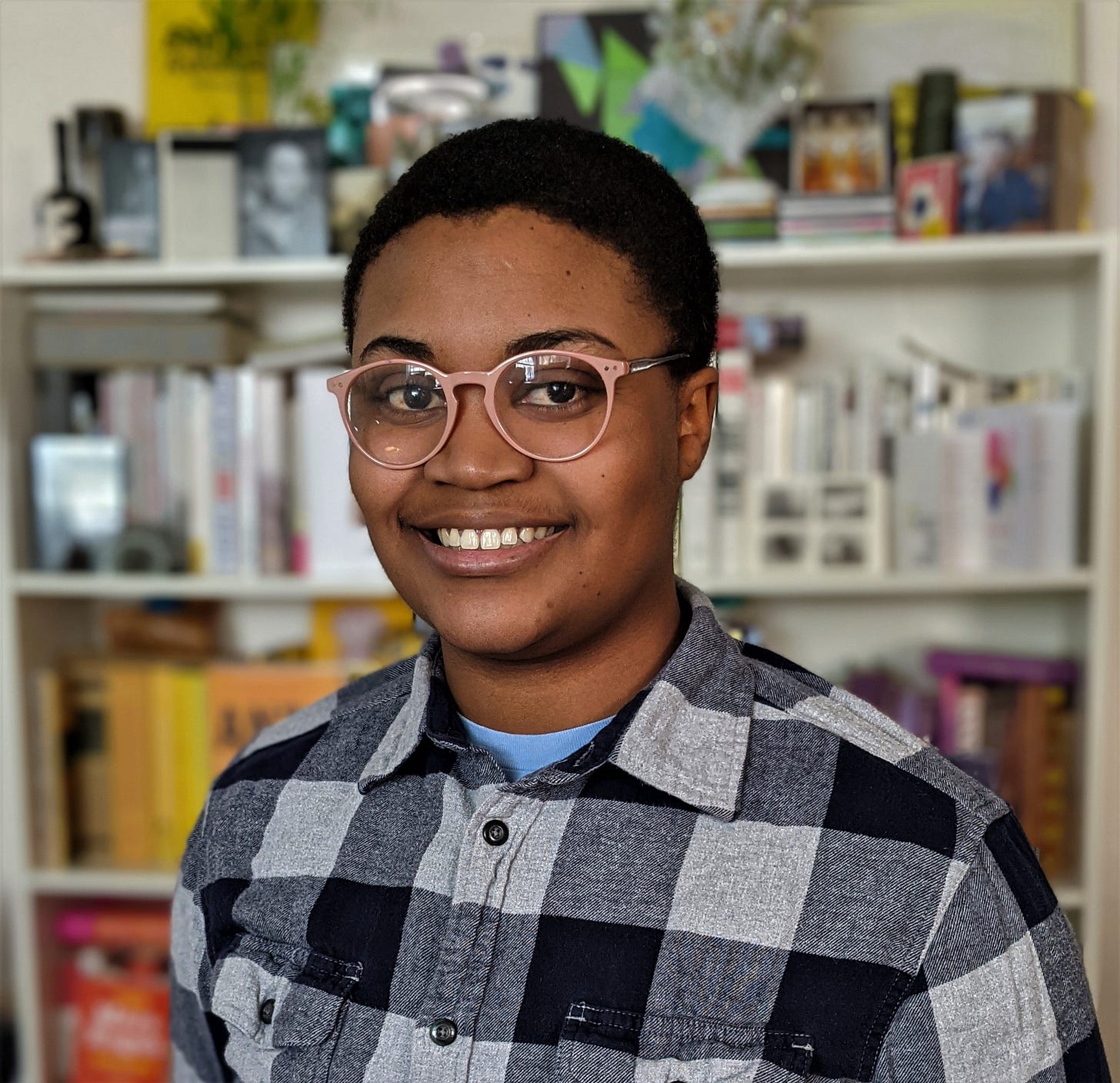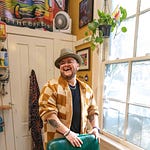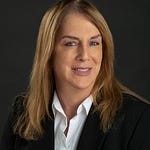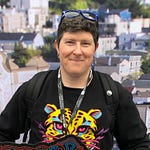TNG Worklife is a podcast and ongoing conversation about the work-life experiences of the transgender, nonbinary, and gender expansive communities.
You can find us on Apple, Spotify, Google and Instagram.
This podcast is always free, and if you enjoyed it, you can support the work by subscribing for as little as $8 a month.
About Raina Nelson
LinkedIn: https://www.linkedin.com/in/raina-nelson94/
Instagram: https://www.instagram.com/assemblagedaydream/
Credits
Opening music - Abstract Fashion Pop by QubeSounds
Closing music - Where the Light Is by lemonmusicstudio
Episode Transcript
[upbeat pop music plays]
[Kai Stowers]
Hello and welcome to Season Two, Episode One of TNG Worklife, a podcast about the experiences of the trans, nonbinary and gender expansive communities in the workplace. This season, we're focusing on the strength we gain by being in community and partnership with each other. Today, I'm speaking with Raina Nelson, Associate Director of Workplace Equality at the Human Rights Campaign about their work with companies who want to do right by their LGBTQ+ employees. They also share their experiences of building solidarity across multiple communities that share experiences of repression and violence.
I left our conversation filled with renewed hope about our path ahead, and my hope is that Raina's reflections on how we can and should center our shared humanity also give you a sense of purpose and commitment to navigate the challenges that lie ahead.
Hi Raina. Welcome to the TNG Worklife podcast. I'm so happy to have you on the show today.
[Raina Nelson]
Awesome. Thank you so much for having me.
[Kai Stowers]
So we'll have a chance to talk about the work you're doing in the world today, but I like to start with when you were a kid, who were you, what did you dream about being when you grew up?
[Raina Nelson]
It's always really interesting to think back about it because of where I am now. But when I was growing up, I was really interested in art and wanted to be an artist or a fashion designer, for a really long time. And the way that I changed as I got to be an older child was just being, exposed to the injustices of the world.
My family always called me the fair police when I was growing up. I was always somebody's attorney. I was always defending somebody. And so that kind of informed me a lot. And I wanted to go maybe more into a social or political direction and ultimately ended up majoring in political science when I went to college.
So that's kind of the trajectory.
[Kai Stowers]
Yeah. You mentioned some of the injustices you saw growing up. What are some of the identities that informed your experiences?
[Raina Nelson]
Yeah. So I think of like identities that have informed my experiences throughout my life. I always think of my Black identity first. So I'm a Black person, and I grew up in the United States, and for some of my time was living in the South. The history of anti-Black racism all throughout the country and the world really informs my identity because it's also something you see about me immediately.
Most of my other identities are relatively invisible or can be hidden. There's no way for me to hide that I'm Black. And so it's always the first thing that's come up and inform my first experiences with discrimination and things like that, being called slurs, being spoken to, you know, unkindly.
Different treatment by teachers, employers, things like that, really informed my experience and still does.
[Kai Stowers]
Yeah.
[Raina Nelson]
So that's certainly what comes up first. And then just my identity as a nonbinary person and coming to that over time, as well as like my identity as a lesbian and identifying as a nonbinary lesbian.
[Kai Stowers]
Yeah. And you came out as nonbinary back in 2016, before there was a broader understanding of what that identity was. Can you share some of the experiences you had in the workplace?
[Raina Nelson]
Yeah. So I feel like for trans people, there was like this really particular time in like the mid 2010s where there was this newer wave of visibility and maybe even some like acceptance. I came out around that time and then in 2016 was going to the workplace and coming out there.
Folks maybe were a little bit aware, but there'd also been some of that reactionary backlash with the bathroom bills, and it still wasn't something that people fully understood. Like, I think looking at our time today, it's completely different the way that people understand trans people for better or for worse.
[Kai Stowers]
Right?
[Raina Nelson]
I would ask folks to use my pronouns and they wouldn't even know what I was talking about.
[Kai Stowers]
And you use they/them pronouns?
[Raina Nelson]
Yes, I do use they/them pronouns. And I have for more than seven years now, but it was something that folks didn't understand, and I ended up being the first nonbinary person that people knew or was like a guinea pig in my workplace.
[Kai Stowers]
Right, I can only imagine how exhausting that had to be to be the guinea pig. The one who was trying to teach everyone,
[Raina Nelson]
Yeah, definitely. And just also how all these identities intersect being a Black person and not wanting to be perceived as angry or upset or defensive towards people because you're worried about keeping my job.
[Kai Stowers]
What was the impact on you as an employee and also as a human being?
[Raina Nelson]
Yeah. I mean, we spend so much of our time at work. And so much of our time being a human being is on the clock, and so it impacted me a lot. Especially when allies would move on to other jobs, I felt very alone. That was a time when I was really depressed and anxious and looking for any way to get out of the job. So it impacted me pretty heavily, especially as people moved on and I had less folks in my corner.
[Kai Stowers]
Yeah. And you talk about your allies, what were some of the ways that they were able to support you when they were still working with you?
[Raina Nelson]
I had two great colleagues when I was at that first job. They were both in the queer community, but not trans and they just understood just because their proximity to the community understood like my pronouns and would use them and go out of their way to advocate for putting them in our workplace signatures and correcting people on my behalf and also, just being friends with me in the workplace. They were just good colleagues. And then, of course, through that, you can be more authentic with people.
[Kai Stowers]
When I came out as trans in the workplace, I guess that was 2019. I was really shocked by how hard it was for me as a trans person to communicate my needs and be heard.
[Raina Nelson]
Yeah.
[Kai Stowers]
And when I would have an ally have that same conversation, it would go so much better.
[Raina Nelson]
It's so true. There is this idea that if you're the trans person or you're the person who's marginalized, that if you're advocating for yourself, you have too much skin in the game to be neutral
[Kai Stowers]
Right. Like what's your real agenda? And I'm like, to be treated like a human being, but
[Raina Nelson]
That evil agenda of being treated like a human being.
[Kai Stowers]
yeah, yeah. So unreasonable.
[laughter]
It was 2019 you joined the HRC. How was that same or different than previous organizations?
[Raina Nelson]
The reason that I even applied for HRC was because I was looking for an LGBTQ organization to work for so I would stop being misgendered in the workplace. The huge difference was that it basically was never a question with my pronouns. And in fact you could put in your pronouns as you were setting up your HR profile and the information system and things like that.
There's all gender neutral bathrooms in the organization. Of course, I was coming in at a privileged time because HRC has definitely had to have some evolution to get to that point.
And so I think it was also the timing that made it different for me.
[Kai Stowers]
I really look forward to the day where having access to gender neutral bathrooms, having people respect the name that you use, the pronouns you use, like this should all be table stakes. And unfortunately, we're just not there yet in a lot of places.
[Raina Nelson]
You end up having to prioritize that over so much else if you can find it.
[Kai Stowers]
With larger numbers of Generation Z who are in that trans, gender expansive nonbinary community, the organizations that do this are really going to have a competitive advantage because people are going to want to work for them.
[Raina Nelson]
That's what we say. That's like our kind of business case is that, the people coming up after me. I'm a young Millennial, and more and more folks in those younger generations are either identifying as trans and nonbinary or don't have an issue with trans and nonbinary people, and in fact, it's an important part of their values to be inclusive.
[Kai Stowers]
You talked about, HRC has done some of its own work, and also HRC helps other organizations move that needle along. What are some of the ways HRC has helped change over time? of
[Raina Nelson]
Yeah, the HRC has been around since the 1980s, but our foundation work, which includes our workplace equality program started in the early 2000s, with the Corporate Equality Index starting in 2002. Through that we were evaluating companies based on their nondiscrimination protections, their benefits, how they're supporting an inclusive culture through things like training and education, as well as their engagement as corporate citizens with the broader LGBTQ+ community and equality minded segments of the population.
We have created our index, which is the premier benchmarking tool for the United States and workplace inclusion. Through that, we influence companies because we have over 1300 employers as of this year, who participate. We've really raised the bar and kind of move the needle on the adoption of some of these best practices. We elevate our criteria year over year, particularly when it comes to Benefits for family formation for domestic partners, and particularly for trans inclusion benefits that we started scoring in the mid to late 2000s.
[Kai Stowers]
What are some of the other benchmarks that companies need in order to rank highly on the CEI?
[Raina Nelson]
Another one of our criteria really focus on the implementation of policies and how you're living into that through training and education. We require that companies have firm-wide training on nondiscrimination that includes the LGBTQ+ community and not just throwing up an EEO policy on a screen and saying, hey, you're covered but, really talking about how sexual orientation and gender identity apply to their policies of nondiscrimination in hiring, firing, promotion, demotion, and expectations of employees and supervisors. We also require that companies go even further, whether it be through skills based training, unconscious bias, diversity training, and talking about LGBTQ+ issues through that. For this most recent iteration of the CEI. We Really push companies to bring an intersectional analysis to their training and education.
And so we were collecting that information to really see what companies are doing in the past, but now we've made it a required component of getting a top score on the index. And so we're looking at the spaces that they're creating for employees, such as Pride ERGs or diversity councils that include LGBTQ+ issues as a part of their mission.
[Kai Stowers]
It's really exciting to hear that the bar is getting higher over time. It's been about five or six years since I worked for a company that ranked really high on the CEI and so benefits, policies, great. But I didn't know any trans people who were out.
[Raina Nelson]
Right.
[Kai Stowers]
So that was pretty concerning and I'd heard all the casual transphobia just in my group and, you know, I talked to HR, and they're like, okay, before anyone can tell that you're transitioning, we need to get to your group first and do some training. And yeah, it's great that HR had my back, but also that's not what you want to hear
[Raina Nelson]
Absolutely, and that points to another component that we've added recently, which is the requirement for a robust set of gender transition guidelines and other initiatives for trans and nonbinary inclusion in the workplace.
The first time that you are thinking about how to integrate a trans employee into your workplace shouldn't be when they're coming to you and telling you about their transition and you having to do this sort of work on the fly and then, possibly make mistakes or prioritize the organization over the employee's wellbeing.
[Kai Stowers]
It seems like the CEI is a starting place rather than a destination.
[Raina Nelson]
Definitely. We say for companies that if they're getting a 100, that's great and shows, their commitment to holding themselves to some sort of accountability. However, it just means that you're meeting what we have identified through our research and our experience as best practices for LGBTQ+ inclusion. There is certainly more that can be done and should be done to evolve past that. That's why we really resist trying to say things like perfect score. The news still says it, of course, but it's not that you're perfect, but that you are meeting best practices for the community.
[Kai Stowers]
The other work that you do at the HRC is supporting companies who are in states that are hostile to the LGBTQ community. There's a lot of organizations who are like, I really want to do right by my people. I see who's in power in my state right now and what can we do? What are some of the pathways that are still open?
[Raina Nelson]
We do this in a lot of ways. We create resources that companies can access on our website about ways that they can lean in to support their employees, as well as ways that they can speak out through our Count Us In campaign.
Which is giving companies the ability to really stand behind their trans and nonbinary employees. But we also speak to companies 1 on 1, so I often have calls with individual companies that are facing specific issues where they live in a hostile state, or they live in a place where trans identity isn't accepted, or their state just passed the law, making particular things illegal, and they need to get our advice on how to help their employees still get the care that they need. We have a lot of those conversations as well as educational webinars, resources as well as round tables with some of the folks that are administering care as well to talk about ways that they can remove barriers for trans employees. Right now, particularly in Florida, there are some barriers around adults getting care, but a lot of other states right now are really focusing on trans youth.
And so we're having a lot of family of trans youth having to go out of state to get the care that their children need, and that costs a lot of money.
[Kai Stowers]
Yeah. Especially if you're in a big state like Texas when you're hours and hours away from a state line.
[Raina Nelson]
Or Florida as well, I used to live in Florida and it takes a full 4 to 6 hours to even get out of that state. So we have encouraged employers to help families pay for those costs.
[Kai Stowers]
Yeah. Great. I know you have advocacy work outside of your role at the HRC. Can you share some of what you're doing there?
[Raina Nelson]
I organize locally here in D.C. to pull together a lot of different places of struggles. So we engage on LGBTQ+ issues, pieces of legislation in the larger area about trans inclusion and trans protections, but we also work on issues of housing and evictions.
I work on issues of police brutality, connecting these places of struggle together, because a lot of them come from the same place. The people that are attacking trans people are also attacking Black and brown people are attacking voting rights and so, in my local community, I'm organizing with those organizations to change the world beyond just tweaks here and there, recognizing that there does have to be some fundamental change to systems.
[Kai Stowers]
What are some of the possibilities that collaboration is bringing to the work that you're doing?
[Raina Nelson]
We don't have to think separately. There's been a lot of evolution on folks talking about their particular experiences as say, marginalized races or gender identities, or experiences of disability. But there's really a tendency to get siloed in those spaces and not see where they come together.
Ultimately power really lies with the amount of people that you can mobilize to try to make change and the more that we come together, we find that we can make a bigger impact, kind of punch above our weight. When we're coming together and seeing our connected struggles, we can focus in on these systems together, to try to change them.
[Kai Stowers]
Yeah. Is there like a specific story or turning point in this work that you could share that really points to the power of what you're doing?
[Raina Nelson]
Absolutely. We have been looking at the current devastation that's happening in Gaza and Palestine. The group that I organize with, we were involved in the March for a Free Palestine. In that organizing, we worked with Indigenous groups. We worked with Palestinian groups. We worked with Jewish groups, Muslim groups Arab majority groups.
We worked with queer groups as well as feminist organizations as well as artists and cultural workers to put all of our focus on that one place and it ended up being one of the largest marches for Palestinian solidarity in American history.
I think it has been a turning point in the solidarity movement where many groups are trying to come together.
[Kai Stowers]
Yeah, it can be such a harmful narrative that, Oh, it's just this one little group. And when we connect our individual liberation with the collective liberation, so much more can happen.
[Raina Nelson]
Certainly certainly, I think in this case in particular, all of these groups know what it's like to face repression and to face violence.
[Kai Stowers]
Yeah. As I think about this political environment, I'm really worried about where it's going. I don't think I'm the only one.
But knowing that there's individuals like you and the organizations that you're working with doing this sort of coalition building definitely helps ground me.
And I'm wondering, as someone who is at this ground level, who isn't looking away from it, what helps you stay grounded? What helps you stay motivated and engaged?
[Raina Nelson]
Yeah, I mean, going back to HRC in that work, I'm obviously seeing the onslaught of, of frankly heinous attacks against the community, disgusting accusations and things like that. Things that have come directly to my inbox because of my work.
Something that helps me stay grounded is my work outside of HRC on behalf of other organizations and so that helps give me a lot of hope.
Saying grounded is really just trying to build authentic relationships with my friends, family, people that I'm meeting through organizing, through this time with so much difficulty and sadness, really just this year in particular, from the very, very beginning, I really had to lean into those people in my community.
So I have so many trans friends and of course, we're sitting and talking about what we're seeing, which is so terrifying, especially for folks that I still know who live in Florida. Um, but being with them and getting joy with them and making food and loving each other has been really important.
And the same with our current moment geopolitically, the folks I'm organizing with their folks who are Palestinian folks who are Muslim folks who are Jewish, leaning into them as my community as well in that work and again, just like having fun with each other. you know, we spent Thanksgiving together.
We, are having holiday parties together and things like that. Finding that joy in the movement itself is so important for our souls, but also to stay motivated to keep going.
[Kai Stowers]
I love that. I have a pretty deep mindfulness practice and one of the things that we always come back to is, In this moment, can I feel my body? And you know, when you were talking about your connections with your community, I was like, yeah, there's all this going on in the world.
And we are right to be afraid. And in this moment, I am cooking food with a good friend.
[Raina Nelson]
Right.
[Kai Stowers]
Yeah.
[Raina Nelson]
Yeah.
Completely. No, exactly. Like in those moments, we can really just recognize our humanity, that anywhere in the world, someone is cooking a meal for their family or thinking about what they're trying to do, or maybe they're sitting in gratitude there as well.
And so yeah,
Just being present is so important.
[Kai Stowers]
Yeah, what are some of the other things that really support you in your work?
[Raina Nelson]
I have more recently gotten back into having an artistic practice. I love to create collage and other types of mixed media art. I'll often express myself through that art, but also escape through that art. And Think about new worlds or how we could create a better world.
[Kai Stowers]
And if people want to see your art, where can they find you?
I have an Instagram. It's, um, Assemblage Daydream. That's just like my Instagram collage page. But, yeah, I share a lot of my art on there.
[Kai Stowers]
Yeah. Excellent.
Is there anything else you want to bring into this conversation?
[Raina Nelson]
Something that I think about a lot is particularly with this moment for trans and nonbinary people. is how we can not only push back against the misinformation about trans youth and trans life, but also how we can imagine what a true kind of free world for people of all gender identities could really look like.
And so I really invite people in this moment of difficulty and pain, particularly if they are allies to trans people, using this time to delve into their own thoughts about gender and gender identity and learn about that, learn about the history of how it's been constructed, about the ways that it intersects with other systems like race, like class to do the work that it does.
I think one of the biggest problems with how folks conceptualize gender is through this kind of naturalization through like this idea that it's inherent in our DNA or our brains or whatever it may be. And I think that that makes people who are not trans feel secure in their gender.
But I think there's an opportunity for us to see ourselves as more connected than not. And cis people's conception of their gender, even though it's different than trans people, still is based on their own feelings about who they are. We can fall back on chromosomes, we can fall back on genitalia and all those sorts of things.
But all those things are mutable, and so there is nothing really inherently gendered about them, except for what we've put on to them. And that applies to cis people as much as trans people. So, I just really invite folks to delve deeper into their thoughts about gender during this time, because I think it will help them to develop more empathy for the community, but also see what a better world could look like that doesn't dictate people's lives based on these things.
[Kai Stowers]
Yeah, how did I come to understand myself as a male or a female? What were the messages I received on how I should look, how I should act? For some people it's like, yeah, the messages I received and how I want to be line up really well. And for some other people, it's like, I wish I just had a little bit more freedom in this way or that way.
And I think that's a place where we can start to bridge some understanding between communities.
[Raina Nelson]
Absolutely.
[Kai Stowers]
I think of so many women, all the ways they are so restricted and how they have to be in order to be heard. Speak up, but don't be too loud, lean in, but also have some work life balance. What would happen if men could have more access to their feelings so that the one feeling they're allowed isn't anger and rage? That might be a good experiment for us to run.
[Raina Nelson]
Right. And necessarily, the liberation of trans people is necessary for the liberation of people of all genders. It's just that trans people are the most marginalized, stigmatized and targeted for falling out of their gender roles. But we see through how folks treat masculine women, or feminine men, or gay, lesbian, bi men and women who are cisgender, the way that those folks are treated is directly connected to transphobia , and that's directly connected to misogyny.
[Kai Stowers]
What if we could celebrate the women who are attracted to men and want to be women and celebrate women who are attracted to other women and celebrate women who are like, yeah, no, actually, I'm going to bounce. There's another gender that works for me better. Right? Could there be space for all of that?
[Raina Nelson]
And that's the world we have to imagine. We have to think that it's possible before we can get to work.
[Kai Stowers]
I love that. We have to think it's possible before we get to work.
[Raina Nelson]
And we have to present a positive vision. Like, of course, we are in a horrible moment and HRC put out the state of emergency, which then prompted Canada to, say that United States might be a dangerous place for trans nonbinary people.
And we're seeing an uptick in backlash all over the world, and in this kind of moment, we have to also present a positive vision
[Kai Stowers]
Right. Because otherwise, why do I even want to get out of bed?
[Raina Nelson]
Right. Or if it's only just so that some people can get hormones and procedures that they need after going through a bunch of hoops and paying thousands of dollars and being gatekept, like that is not a vision of the world that I'm fighting for.
[Kai Stowers]
Yeah, and I think there's a real risk in this level of emergency. We get tunnel vision of oh, here's just like the next fight we need to win rather than being like more strategically, what is the kind of world that we want to live in? What is the kind of world we want to leave to our children?
[Raina Nelson]
Right. I'm going to turn 30 next year, and I'm thinking about my little sister, who's also queer and nonbinary. My mom really lucked out. Um, and she's ten years younger than me. I think all the time about what kind of world I'm like leaving for her.
And the people who are younger than her as well, and we all have to do that work, even if we don't see all the changes we want in our lifetimes, we're thinking about how are we tilling the soil for future things to grow.
[Kai Stowers]
If we really have a big, audacious vision, that's not going to be something that can be done in six months or a year, right? To have that, I don't know, almost that faith and trust in both ourselves and future generations to continue the work, it feels really important to me.
[Raina Nelson]
Yeah, I totally agree.
[Kai Stowers]
What's one thought that you'd like to leave our listeners with?
[Raina Nelson]
A better world is possible, not only are we going to get through this current moment, we have a responsibility to build that better world as we go and as we have peaks and valleys in these movements.
And we also have to win ultimately for the good of everybody in the society. We have to dismantle these structures. Not to be dramatic. It's our only chance for survival. If we think of climate change and all of these other threats. And so when I say a better world is possible, it's not even me being an idealist.
It's me being pragmatic because we have to have one in order for society to continue moving forward. So that's definitely what I would leave with people.
[optimistic music plays]
[Kai Stowers]
All right. Well, thank you so much. I've really enjoyed our conversation today.
[Raina Nelson]
I really enjoyed it as well thank you so much for having me. It's been great.
[Kai Stowers]
Thank you so much for listening to Season Two, Episode One of TNG Worklife, an independent podcast produced by Kai Stowers LLC. This podcast is always free, and if you enjoyed it, you can support the work by subscribing at tngworklife.substack.com for as little as $8 a month. Your generous support goes towards production costs, and paying subscribers receive additional content as well as discounts on workshops and trainings that I lead. If you would like to learn more about my coaching and consulting work, you can contact me through my website, KaiStowers. com.
Finally, I wish that each of you find grounding, connection, and abundance in your lives.











